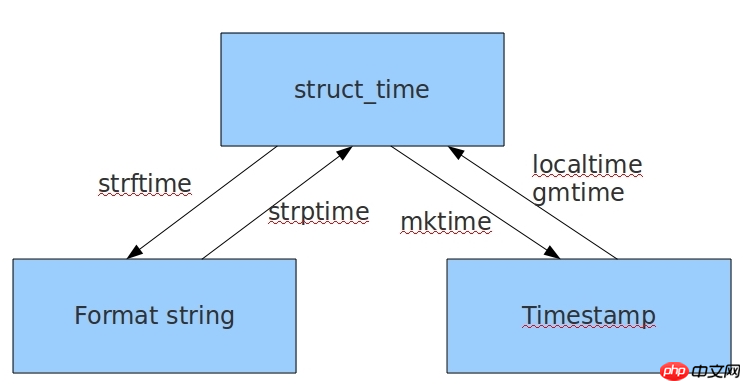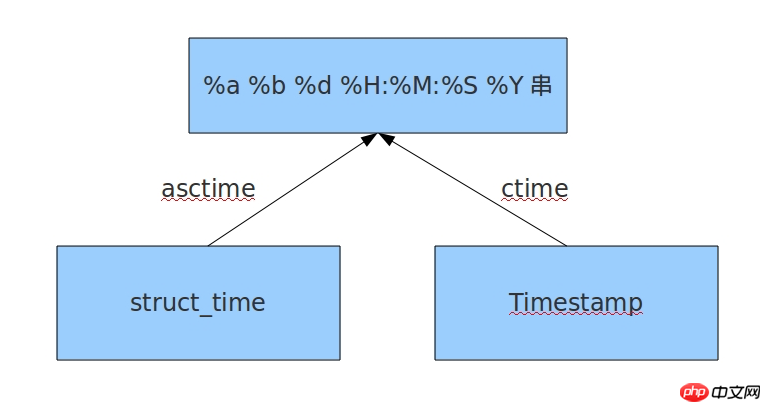
The following editor will bring you an article about the time module of python module (explanation with examples). The editor thinks it’s pretty good, so I’ll share it with you now and give it as a reference. Let’s follow the editor and take a look.
time
Three forms of time representation
Timestamp (timestamp) : Generally speaking, the timestamp represents the offset in seconds from 00:00:00 on January 1, 1970. We run "type(time.time())" and the return type is float.
Formatted time string (Format String): '1999-12-06'
Time formatting symbol
''' %y 两位数的年份表示(00-99) %Y 四位数的年份表示(000-9999) %m 月份(01-12) %d 月内中的一天(0-31) %H 24小时制小时数(0-23) %I 12小时制小时数(01-12) %M 分钟数(00=59) %S 秒(00-59) %a 本地简化星期名称 %A 本地完整星期名称 %b 本地简化的月份名称 %B 本地完整的月份名称 %c 本地相应的日期表示和时间表示 %j 年内的一天(001-366) %p 本地A.M.或P.M.的等价符 %U 一年中的星期数(00-53)星期天为星期的开始 %w 星期(0-6),星期天为星期的开始 %W 一年中的星期数(00-53)星期一为星期的开始 %x 本地相应的日期表示 %X 本地相应的时间表示 %Z 当前时区的名称 %% %号本身 '''
Tuple (struct_time): The struct_time tuple has a total of 9 elements: (year, month, day, hour, minute, second, week of the year, day of the year Wait
Tuple element meaning
""" 索引(Index)属性(Attribute) 值(Values) tm_year(年) 比如2011 tm_mon(月) 1 - 12 tm_mday(日) 1 - 31 tm_hour(时) 0 - 23 tm_min(分) 0 - 59 tm_sec(秒) 0 - 61 tm_wday(weekday) 0 - 6(0表示周日) tm_yday(一年中的第几天) 1 - 366 tm_isdst(是否是夏令时) 默认为-1 """
Several formats for expressing time in python
#导入时间模块
>>>import time
#时间戳
>>>time.time()
1500875844.800804
#时间字符串
>>>time.strftime("%Y-%m-%d %X")
'2017-07-24 13:54:37'
>>>time.strftime("%Y-%m-%d %H-%M-%S")
'2017-07-24 13-55-04'
#时间元组:localtime将一个时间戳转换为当前时区的struct_time
time.gmtime()
time.localtime()
time.struct_time(tm_year=2017, tm_mon=7, tm_mday=24,
tm_hour=13, tm_min=59, tm_sec=37,
tm_wday=0, tm_yday=205, tm_isdst=0)
# 小结:时间戳是计算机能够识别的时间;时间字符串是人能够看懂的时间;元组则是用来操作时间Conversion between various formatted times

#时间戳-->结构化时间 #time.gmtime(时间戳) #UTC时间,与英国伦敦当地时间一致 #time.localtime(时间戳) #当地时间。例如我们现在在北京执行这个方法:与UTC时间相差8小时,UTC时间+8小时 = 北京时间 >>>time.gmtime(1500000000) time.struct_time(tm_year=2017, tm_mon=7, tm_mday=14, tm_hour=2, tm_min=40, tm_sec=0, tm_wday=4, tm_yday=195, tm_isdst=0) >>>time.localtime(1500000000) time.struct_time(tm_year=2017, tm_mon=7, tm_mday=14, tm_hour=10, tm_min=40, tm_sec=0, tm_wday=4, tm_yday=195, tm_isdst=0) #结构化时间-->时间戳 #time.mktime(结构化时间) >>>time_tuple = time.localtime(1500000000) >>>time.mktime(time_tuple) 1500000000.0
#结构化时间-->字符串时间
#time.strftime("格式定义","结构化时间") 结构化时间参数若不传,则现实当前时间
>>>time.strftime("%Y-%m-%d %X")
'2017-07-24 14:55:36'
>>>time.strftime("%Y-%m-%d",time.localtime(1500000000))
'2017-07-14'
#字符串时间-->结构化时间
#time.strptime(时间字符串,字符串对应格式)
>>>time.strptime("2017-03-16","%Y-%m-%d")
time.struct_time(tm_year=2017, tm_mon=3, tm_mday=16, tm_hour=0, tm_min=0, tm_sec=0, tm_wday=3, tm_yday=75, tm_isdst=-1)
>>>time.strptime("07/24/2017","%m/%d/%Y")
time.struct_time(tm_year=2017, tm_mon=7, tm_mday=24, tm_hour=0, tm_min=0, tm_sec=0, tm_wday=0, tm_yday=205, tm_isdst=-1)
##
#结构化时间 --> %a %b %d %H:%M:%S %Y串 #time.asctime(结构化时间) 如果不传参数,直接返回当前时间的格式化串 >>>time.asctime(time.localtime(1500000000)) 'Fri Jul 14 10:40:00 2017' >>>time.asctime() 'Mon Jul 24 15:18:33 2017' #%a %d %d %H:%M:%S %Y串 --> 结构化时间 #time.ctime(时间戳) 如果不传参数,直接返回当前时间的格式化串 >>>time.ctime() 'Mon Jul 24 15:19:07 2017' >>>time.ctime(1500000000) 'Fri Jul 14 10:40:00 2017'
Calculate time difference
import time
true_time=time.mktime(time.strptime('2017-09-11 08:30:00','%Y-%m-%d %H:%M:%S'))
time_now=time.mktime(time.strptime('2017-09-12 11:00:00','%Y-%m-%d %H:%M:%S'))
dif_time=time_now-true_time
struct_time=time.gmtime(dif_time)
print('过去了%d年%d月%d天%d小时%d分钟%d秒'%(struct_time.tm_year-1970,struct_time.tm_mon-1,
struct_time.tm_mday-1,struct_time.tm_hour,
struct_time.tm_min,struct_time.tm_sec))The above is the detailed content of Introduction to the time module of python module. For more information, please follow other related articles on the PHP Chinese website!




